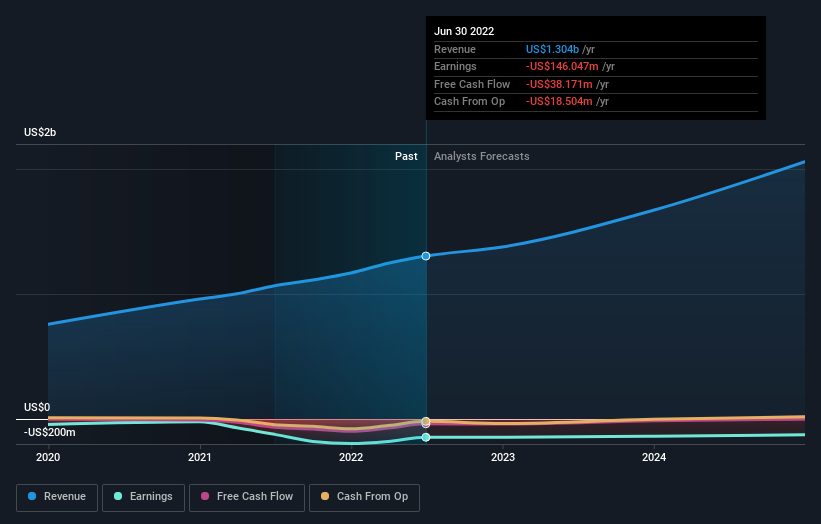Painful week for private equity firms invested in Alignment Healthcare, Inc. (NASDAQ:ALHC) after 5.1% drop, institutions also suffered losses
A look at the shareholders of Alignment Healthcare, Inc. (NASDAQ:ALHC) can tell us which group is most powerful. We can see that private equity firms own the lion's share in the company with 42% ownership. That is, the group stands to benefit the most if the stock rises (or lose the most if there is a downturn).
While the holdings of private equity firms took a hit after last week’s 5.1% price drop, institutions with their 34% holdings also suffered.
Let's delve deeper into each type of owner of Alignment Healthcare, beginning with the chart below.
View our latest analysis for Alignment Healthcare
What Does The Institutional Ownership Tell Us About Alignment Healthcare?
Institutional investors commonly compare their own returns to the returns of a commonly followed index. So they generally do consider buying larger companies that are included in the relevant benchmark index.
Alignment Healthcare already has institutions on the share registry. Indeed, they own a respectable stake in the company. This can indicate that the company has a certain degree of credibility in the investment community. However, it is best to be wary of relying on the supposed validation that comes with institutional investors. They too, get it wrong sometimes. It is not uncommon to see a big share price drop if two large institutional investors try to sell out of a stock at the same time. So it is worth checking the past earnings trajectory of Alignment Healthcare, (below). Of course, keep in mind that there are other factors to consider, too.
Hedge funds don't have many shares in Alignment Healthcare. The company's largest shareholder is General Atlantic Service Company, L.P., with ownership of 33%. For context, the second largest shareholder holds about 9.6% of the shares outstanding, followed by an ownership of 9.0% by the third-largest shareholder. In addition, we found that John Kao, the CEO has 1.5% of the shares allocated to their name.
To make our study more interesting, we found that the top 3 shareholders have a majority ownership in the company, meaning that they are powerful enough to influence the decisions of the company.
Researching institutional ownership is a good way to gauge and filter a stock's expected performance. The same can be achieved by studying analyst sentiments. There are a reasonable number of analysts covering the stock, so it might be useful to find out their aggregate view on the future.
Insider Ownership Of Alignment Healthcare
The definition of an insider can differ slightly between different countries, but members of the board of directors always count. Management ultimately answers to the board. However, it is not uncommon for managers to be executive board members, especially if they are a founder or the CEO.
Most consider insider ownership a positive because it can indicate the board is well aligned with other shareholders. However, on some occasions too much power is concentrated within this group.
We can see that insiders own shares in Alignment Healthcare, Inc.. This is a big company, so it is good to see this level of alignment. Insiders own US$116m worth of shares (at current prices). If you would like to explore the question of insider alignment, you can click here to see if insiders have been buying or selling.
General Public Ownership
The general public-- including retail investors -- own 18% stake in the company, and hence can't easily be ignored. This size of ownership, while considerable, may not be enough to change company policy if the decision is not in sync with other large shareholders.
Private Equity Ownership
Private equity firms hold a 42% stake in Alignment Healthcare. This suggests they can be influential in key policy decisions. Sometimes we see private equity stick around for the long term, but generally speaking they have a shorter investment horizon and -- as the name suggests -- don't invest in public companies much. After some time they may look to sell and redeploy capital elsewhere.
Next Steps:
While it is well worth considering the different groups that own a company, there are other factors that are even more important. For example, we've discovered 2 warning signs for Alignment Healthcare that you should be aware of before investing here.
If you are like me, you may want to think about whether this company will grow or shrink. Luckily, you can check this free report showing analyst forecasts for its future.
NB: Figures in this article are calculated using data from the last twelve months, which refer to the 12-month period ending on the last date of the month the financial statement is dated. This may not be consistent with full year annual report figures.
Have feedback on this article? Concerned about the content? Get in touch with us directly. Alternatively, email editorial-team (at) simplywallst.com.
This article by Simply Wall St is general in nature. We provide commentary based on historical data and analyst forecasts only using an unbiased methodology and our articles are not intended to be financial advice. It does not constitute a recommendation to buy or sell any stock, and does not take account of your objectives, or your financial situation. We aim to bring you long-term focused analysis driven by fundamental data. Note that our analysis may not factor in the latest price-sensitive company announcements or qualitative material. Simply Wall St has no position in any stocks mentioned.
Join A Paid User Research Session
You’ll receive a US$30 Amazon Gift card for 1 hour of your time while helping us build better investing tools for the individual investors like yourself. Sign up here


